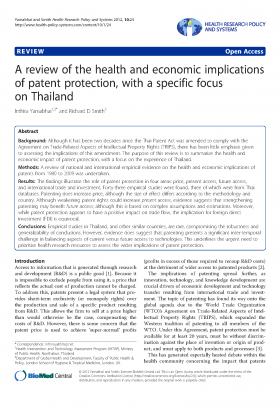This website uses cookies so that we can provide you with the best user experience possible. Cookie information is stored in your browser and performs functions such as recognising you when you return to our website and helping our team to understand which sections of the website you find most interesting and useful.
A review of the health and economic implications of patent protection, with a specific focus on Thailand (2012)

Details
Inthira Yamabhai1,2* and Richard D Smith2
Abstract
Background: Although it has been two decades since the Thai Patent Act was amended to comply with the Agreement on Trade-Related Aspects of Intellectual Property Rights (TRIPS), there has been little emphasis given
to assessing the implications of this amendment. The purpose of this review is to summarize the health and economic impact of patent protection, with a focus on the experience of Thailand. Methods: A review of national and international empirical evidence on the health and economic implications of patents from 1980 to 2009 was undertaken.
Results: The findings illustrate the role of patent protection in four areas: price, present access, future access, and international trade and investment. Forty-three empirical studies were found, three of which were from Thai
databases. Patenting does increase price, although the size of effect differs according to the methodology and country. Although weakening patent rights could increase present access, evidence suggests that strengthening
patenting may benefit future access; although this is based on complex assumptions and estimations. Moreover, while patent protection appears to have a positive impact on trade flow, the implication for foreign direct
investment (FDI) is equivocal.
Conclusions: Empirical studies in Thailand, and other similar countries, are rare, compromising the robustness and generalizability of conclusions. However, evidence does suggest that patenting presents a significant inter-temporal
challenge in balancing aspects of current versus future access to technologies. This underlines the urgent need to prioritize health research resources to assess the wider implications of patent protection.
Full text can be accessed from:
http://www.ncbi.nlm.nih.gov/pubmed/22849392
http://www.health-policy-systems.com/content/pdf/1478-4505-10-24.pdf




